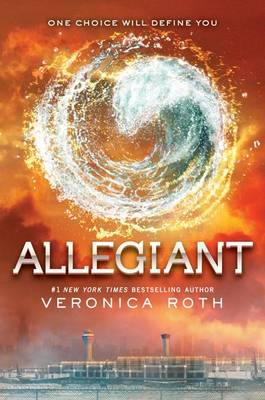Reviewed by ladygrey on
Which is why this series has always been difficult for me. There are things I recognize [a:Veronica Roth|4039811|Veronica Roth|https://d202m5krfqbpi5.cloudfront.net/authors/1363910238p2/4039811.jpg] is doing, or attempting, or striving for. Things I respect her for and even sometimes things she does well. And then there are things I kind of can't stand. So it's a series compiled of extremes.
For starters, the writing is just so painful. It's really like a 2nd or 3rd grade reading level and maybe that's part of why it's a NY Times bestselling series - because people like things that are simple and easy. But it's so blunt and overly simplistic it's just hard to read.
And I have issues with the characters. I don't like Tris nearly as much as all the other characters do.
But I do like that Roth deals with things. When Tris lied and lied and lied in [b:Insurgent|11735983|Insurgent (Divergent, #2)|Veronica Roth|https://d202m5krfqbpi5.cloudfront.net/books/1325667729s/11735983.jpg|15524542] it drove me crazy but Roth didn't let her get away with it. She and Four dealt with it in this book (or at least talked about it) and that helped. And it bothered me that Tris never forgave anybody. ever. No matter how much she loved them. In the last book she found ways to trust her enemies while she was lying to the people she loved and in this one she found compassion for her enemy while she was so cold and bitter with the people she loved. But Roth didn't let her get away with that either and she figured out how to forgive.
And Four! So much of what he goes through in this book is such a violation of his character. I don't care how many times you use the word broken or damaged Four is strong and confident and he takes risks but he isn't impulsive - he looks at the situation and thinks things through. But Roth made him the opposite of all that and you can have characters go through hard things and identity crises but as an author you don't get to betray your characters like that. I would complain about how Four regretted the whole rebellion thing then didn't tell the Bureau the invaders were inoculated against truth serum but that became an irrelevant plot point like a lot of her plot points so I let it go.
Also, that alternating point of view. I get why she did that but it didn't really work except for the one purpose it served. Because the character's voices were not distinct. Several times when I was reading Four's pov I thought it was Tris until the pronouns or object clues made me stop and question whose pov I was reading.
I like what she's trying to do - the ideas she puts forth about identity and what happens when that's taken away. And the dark side of virtues. And the significance of the people we love and how they make up our lives. And everything about fear and bravery. They're all really interesting concepts and she suggests some interesting things about them. And I have to admit in a world is [b:Twilight|41865|Twilight (Twilight, #1)|Stephenie Meyer|https://d202m5krfqbpi5.cloudfront.net/books/1361039443s/41865.jpg|3212258] and [a:Stephenie Meyer|941441|Stephenie Meyer|https://d202m5krfqbpi5.cloudfront.net/authors/1269985304p2/941441.jpg] it was really good to hear Tris talk about self-sacrifice and love and show it's a last possible option after you've exhausted everything else - not something you choose because it's easy or quickly like a martyr. And about how it's not sacrifice if it's someone else's life you're ending. But they're just words in a world with a lot of details and not a lot of depth.
In the end, I wanted to give this book three stars and just couldn't bring myself to. And not even because of the ending. I almost kind of didn't mind that because as difficult as it was in the aftermath, it was also kind of perfectly appropriate. Because Tris could never live in this new world. She just didn't make sense in it.
And the thing is, I like Veronica Roth. If you read her blog at all it's apparent she has a clear head and is reasonable and thoughtful about her story and her characters and the choices she makes. I really liked the entry she posted about the end of Allegiant. It makes me wish what she was going for had come out in the stories better. But she's still cool.
Reading updates
- Started reading
- 11 December, 2013: Finished reading
- 11 December, 2013: Reviewed
